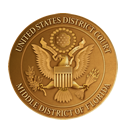(a) PURPOSE. This rule prescribes minimum requirements of courtroom decorum and supplements the Code of Professional Responsibility and the Rules Regulating The Florida Bar.
(b) MINIMUM REQUIREMENTS FOR LAWYERS, PARTIES, AND OTHER OBSERVERS. When in court, a person:
(1) must stand, if able, when court is opened, recessed, and adjourned;
(2) must stand, if able, when the jury enters and leaves the courtroom;
(3) must refrain from any gesture, expression, comment, or noise that manifests approval or disapproval;
(4) must not wear clothing intended or likely to influence or distract a juror;
(5) must keep an electronic device on silent mode;
(6) if at counsel table, must use an electronic device only for the matter under consideration; and
(7) must not eat or drink anything except water.
(c) ADDITIONAL REQUIREMENTS FOR LAWYERS AND PRO SE PARTIES. When in court, a lawyer and a pro se party:
(1) must stand, if able, when addressing, or being addressed by, the judge;
(2) must hand the courtroom deputy a document offered for the judge’s examination;
(3) must stand, if able, behind the lectern when presenting the opening statement or the closing argument or when examining a witness unless approaching the witness or the courtroom deputy with an exhibit or approaching a demonstrative exhibit;
(4) must not echo a witness’s answer when examining the witness;
(5) must state only the legal basis for an objection unless the judge requests elaboration;
(6) must not offer or request a stipulation within the hearing of the jury;
(7) must address only the judge when commenting, inquiring, or arguing;
(8) must refrain from any display of animosity toward anyone in the courtroom, including a lawyer, litigant, or witness;
(9) must refer to a person by the person's title and surname (for example, Ms. Smith or Dr. Robinson) or case designation (for example, "the plaintiff," "the defendant," or "the witness");
(10) must call the judge "Judge [Last Name]" or "Your Honor"; and
(11) in an opening statement and a closing argument:
(A) must not express personal knowledge or opinion and
(B) must not suggest that the jury can or should request a transcript.
(d) ADDITIONAL REQUIREMENTS FOR LAWYERS ONLY. When in court, a lawyer:
(1) must ensure a client and witness know and observe this rule and
(2) must limit examination or cross-examination of a witness to one lawyer for each party and ensure the lawyer who objects during direct examination of a witness is the same lawyer who cross-examines the witness.
(e) PROCEEDING BY TELEPHONE OR VIDEO. If a judge conducts a proceeding by telephone or video, a participant:
(1) must dress in professional attire and use a professional background if either is visible,
(2) must use a landline if available,
(3) must designate one speaker for each party or interested person,
(4) must not participate from a vehicle,
(5) must use the mute setting when not speaking,
(6) must try to avoid background noise or other interference,
(7) must wait for the judge to address the participant before speaking and must not interrupt a speaker, and
(8) must start each distinct presentation by saying "this is [name]" or the equivalent.
